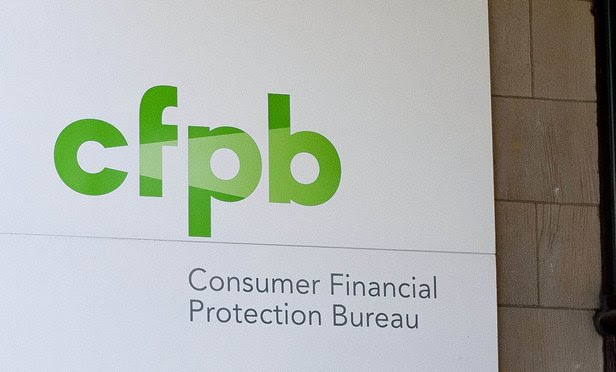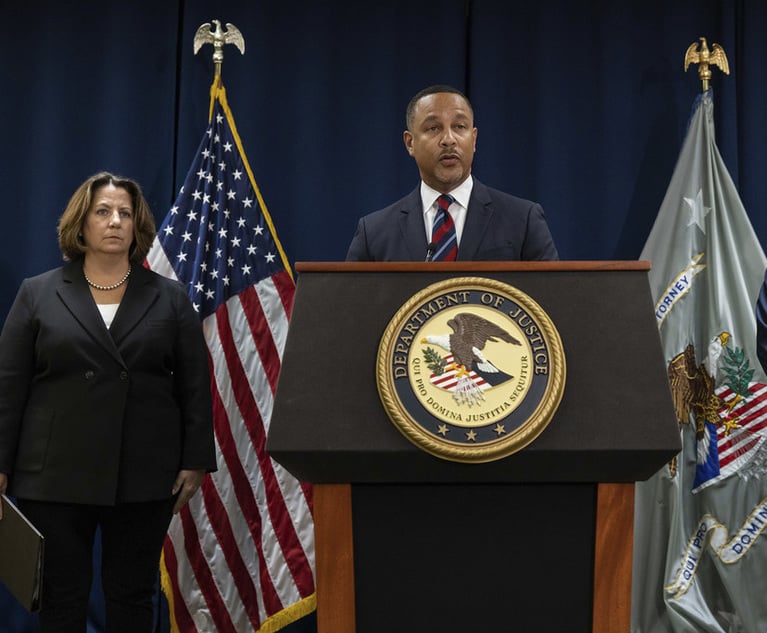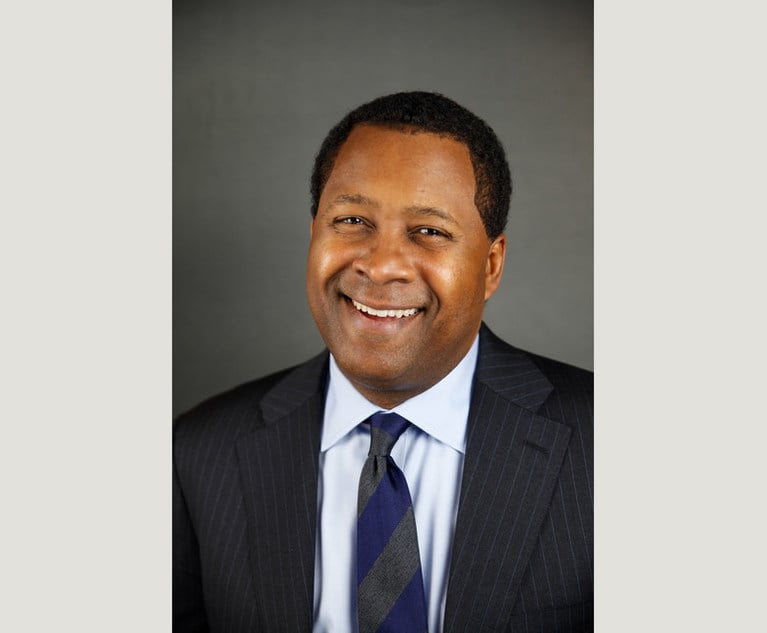Compliance Hot Spots: White-Collar Recruitment | New DOJ Fraud Section Chief | IRS Warns Crypto Holders | Who Got the Work
What's the downturn in white-collar enforcement mean for the recruitment of ex-prosecutors? Plus: we're closely following the new CFPB case at the US Supreme Court. Thanks for reading Compliance Hot Spots!
July 30, 2019 at 09:00 PM
8 minute read
Welcome to Compliance Hot Spots, our weekly summary of news and analysis on regulatory, compliance and enforcement trends. This week we're highlighting: White-collar recruitment and new attacks on the Consumer Financial Protection Bureau. Scroll down for Who Got the Work, and all the new moves.
Tips, feedback and general thoughts on your practices are always appreciated. I'm C. Ryan Barber—reach me at [email protected] and 202-828-0315, or follow me on Twitter @cryanbarber. Thanks for reading!

Law Firms, Ex-Prosecutors Adapt Amid White-Collar Slowdown
What's the Trump-era diminished white-collar enforcement mean for law firm recruitment and hiring?
My colleague Jack Newsham reports a general slowdown in hiring demand, and some white-collar defense attorneys are shifting practices to focus on other areas. Other white-collar practice heads said the supply of potential hires hasn't fluctuated much either way. Read our full report here.
• Jeff Liebster, a recruiter at Major, Lindsey & Africa, said firms are still hiring but being more choosy in the white-collar arena. “Firms are not building benches. Firms are responding to strategic needs,” he said.
• White-collar practice heads and office leaders say they are keeping their lawyers busy with internal investigations, health care fraud and Foreign Corrupt Practices Act compliance and enforcement.
• Brad Karp, chairman of Paul, Weiss, Rifkind, Wharton & Garrison, said there has long been an “ebb and flow” to enforcement and said his firm didn't make partnership decisions based on “short-term market dynamics.”
• On the West Coast, the lateral market for such talent has been heating up in recent months as firms gear up to represent tech giants in a range of high-profile and nonpublic investigations involving theft of trade secrets, privacy and other matters.

Business Groups Line Up Against CFPB
Business advocates are lining up against the Consumer Financial Protection Bureau in a case at the U.S. Supreme Court. Paul Weiss partner Kannon Shanmugamrepresents Seila Law LLC in pushing to overturn a Ninth Circuit decision upholding the agency's independent, single-director design as constitutional. Scott Keller of Baker Botts filed an amicus brief in the Supreme Court this week on behalf of the Cato Institute backing Seila Law. “The statute here goes too far, granting a single director an unprecedented amount of independence from the political branches,” wrote Keller, a former Texas solicitor general who now leads the Baker Botts appellate practice. Keller's successor, Kyle Hawkins, filed a brief for Texas and other red states. Read more from my colleague Nate Robson: Current and Former Texas Solicitors General Line Up Against CFPB.
Mayer Brown's Andrew Pincus filed a brief on behalf of the U.S. Chamber of Commerce in support of Seila Law. “The Bureau has exercised vast authority over the past six years, dramatically reshaping markets for entire categories of consumer financial products and services. Its regulations reach all corners of the consumer financial services market, covering companies large and small. And more Bureau regulations have been proposed,” Pincus wrote.
The U.S. Justice Department got an extension to file its brief next month, and we can expect SG Noel Francisco will challenge the constitutionality of the consumer bureau's structure. DOJ pitched the justices on taking up the issue, but not using a D.C. Circuit case as the vehicle. (The case at the high court last year would have caused now-Justice Brett Kavanaugh to recuse.) Kavanaugh has assailed the power of the bureau, calling it “massive” and “unchecked.”

Who Got the Work
>> Facebook turned to Wilmer Cutler Pickering Hale and Dorr partner Benjamin Neaderland as it negotiated a $100 million settlement with the Securities and Exchange Commission, resolving claims that the tech giant made misleading disclosures about the risk of misuse of user date. The SEC alleged that Facebook's disclosures presented the risk of data misuse as merely hypothetical when, in fact, the company was aware that a third-party developer had misused data.
>> A team from Alston & Bird has registered to lobby for CVS Health on “issues related to the implementation of health care reform and issues related to PBMs and drug pricing.” The team includes former North Dakota Rep. Earl Pomeroy and Michael Park, former health policy counsel at the Senate Finance Committee.
>> Holland & Knight ”has been engaged to lobby on behalf of nine individuals who are Indian national guest workers in Saudi Arabia imprisoned for practicing their religious beliefs,” according to a new Foreign Agents Registration Act disclosure.

Compliance Reading Room
>> U.S. Sanctions Compliance Fines Hit Decade High. “This year's enforcement actions reflect a broadening range and the diversity of sanctions programs being enforced, said Adam M. Smith, a partner at Gibson, Dunn & Crutcher LLP who served as a senior adviser to the OFAC director under the Obama Administration. 'People have originally long thought of OFAC as a banking enforcement agency,' Mr. Smith said. 'But we're seeing a lot of aggressiveness on the non-bank side and that's a big change.'” [WSJ]
>> Trump's Former Anti-Discrimination Official 'May Have Abused His Authority': Inspector General. “A former top Trump administration appointee at the Consumer Financial Protection Bureau 'may have abused his authority' and 'misused his position for private gain' in an attempt to defuse an article from The Washington Post about online posts in which he questioned whether the n-word was racist, according to an inspector general's report. [The Washington Post] American Banker has more here.
>> CFTC's Glencore Investigation Seen Reflecting Broader U.S. Anti-Corruption Strategy. “The announcement by Glencore is the first disclosure of a CFTC investigation involving potential corruption since the U.S. derivatives regulator announced it was expanding its enforcement remit in March. CFTC enforcement director James McDonald at the time said he was seeking to uncover bribes paid in exchange for commodities-related services.” [Reuters]
 >> IRS Sending Warning Letters to More Than 10,000 Cryptocurrency Holders. “The Internal Revenue Service has begun sending letters to more than 10,000 cryptocurrency holders, warning about penalties for failing to report income and pay tax on transactions involving virtual currencies.” [WSJ] Read the IRS news bulletin here. “Taxpayers should take these letters very seriously by reviewing their tax filings and when appropriate, amend past returns and pay back taxes, interest and penalties,” IRS Commissioner Chuck Rettig (at left) said. “The IRS is expanding our efforts involving virtual currency, including increased use of data analytics. We are focused on enforcing the law and helping taxpayers fully understand and meet their obligations.”
>> IRS Sending Warning Letters to More Than 10,000 Cryptocurrency Holders. “The Internal Revenue Service has begun sending letters to more than 10,000 cryptocurrency holders, warning about penalties for failing to report income and pay tax on transactions involving virtual currencies.” [WSJ] Read the IRS news bulletin here. “Taxpayers should take these letters very seriously by reviewing their tax filings and when appropriate, amend past returns and pay back taxes, interest and penalties,” IRS Commissioner Chuck Rettig (at left) said. “The IRS is expanding our efforts involving virtual currency, including increased use of data analytics. We are focused on enforcing the law and helping taxpayers fully understand and meet their obligations.”
>> Federal Court Upholds CFTC Enforcement Power Thanks to Grammar. “The futures and derivatives regulator generally doesn't have regulatory authority over retail commodities trading, but its enforcement authority was expanded under the 2010 Dodd-Frank Act. 'A two-letter conjunction and a two-word phrase decide this case,' Judge Eugene Siler, sitting on the U.S. Court of Appeals for the Ninth Circuit, said in a July 25 opinion. 'At stake are hundreds of millions of dollars.'” [Bloomberg Law]
>> Vinson & Elkins Partner Ephraim Wernick on FCPA Enforcement. “I never saw politics play a hand in the enforcement of FCPA cases in the unit. I can't speak to what was happening elsewhere in the Department. But this was not an area where I saw the administration take an active role one way or another.” [Corporate Crime Reporter]

All the New Moves & Announcements
• “The U.S. Justice Department has appointed Robert Zink as chief of the agency's criminal fraud section,” WSJ reports. Zink, who joined the fraud section in 2010, had served as the acting head since January. The move set in motion a reshuffling within the Justice Department's fraud section, as Joseph Beemsterboer and Daniel Kahn, the respective chiefs of the health care fraud and Foreign Corrupt Practices Act units, rose to become senior deputy chiefs of the section.
• The California boutique Browne George Ross has hired Nathan Hochman from Morgan, Lewis & Bockius. Hochman is a former head of the Justice Department's tax division.
• Robert Cohen, the head of the SEC enforcement division's cyber unit, is leaving the agency after two years overseeing a team that focused on cryptocurrencies and computer hacking. His departure ends a 15-year tenure at the SEC, where he had previously been co-chief of the enforcement division's market abuse unit.
• Crowell & Moring's hired Eric Ransom as senior counsel in the firm's government contracts group. Ransom formerly worked at the U.S. Government Accountability Office Procurement Law Division and the U.S. Senate Committee on Rules and Administration.
• Gray Reed has added former U.S. Securities and Exchange Commission trial lawyer Chris Davis as a partner in Dallas to lead the firm's white-collar defense practice group.
This content has been archived. It is available through our partners, LexisNexis® and Bloomberg Law.
To view this content, please continue to their sites.
Not a Lexis Subscriber?
Subscribe Now
Not a Bloomberg Law Subscriber?
Subscribe Now
NOT FOR REPRINT
© 2025 ALM Global, LLC, All Rights Reserved. Request academic re-use from www.copyright.com. All other uses, submit a request to [email protected]. For more information visit Asset & Logo Licensing.
You Might Like
View All
Compliance Hot Spots: GOP Eyes ESG as an Antitrust Issue + Another DOJ Crypto Seizure + Sidley Partner Jumps to Main Justice
9 minute read
Compliance Hot Spots: Lessons from Lafarge + Fraud Section Chief Talks Compliance + Cravath Lands FTC Commissioner
11 minute readTrending Stories
- 1On The Move: Energy Infrastructure Pro Joins Moore & Van Allen, Adams & Reese Changes Atlanta Leadership
- 2Miami Attorneys Secure $4M Settlement Despite Insurance Limits
- 3NY Judge Admonished Over Contributions to Progressive Political Causes
- 4Legaltech Rundown: Alexi Launches an AI Litigation Tool, Hotshot Announces Private Equity Practice Courses, and More
- 56-48. It’s Comp Time Again: How To Crush Your Comp Memo
Who Got The Work
Michael G. Bongiorno, Andrew Scott Dulberg and Elizabeth E. Driscoll from Wilmer Cutler Pickering Hale and Dorr have stepped in to represent Symbotic Inc., an A.I.-enabled technology platform that focuses on increasing supply chain efficiency, and other defendants in a pending shareholder derivative lawsuit. The case, filed Oct. 2 in Massachusetts District Court by the Brown Law Firm on behalf of Stephen Austen, accuses certain officers and directors of misleading investors in regard to Symbotic's potential for margin growth by failing to disclose that the company was not equipped to timely deploy its systems or manage expenses through project delays. The case, assigned to U.S. District Judge Nathaniel M. Gorton, is 1:24-cv-12522, Austen v. Cohen et al.
Who Got The Work
Edmund Polubinski and Marie Killmond of Davis Polk & Wardwell have entered appearances for data platform software development company MongoDB and other defendants in a pending shareholder derivative lawsuit. The action, filed Oct. 7 in New York Southern District Court by the Brown Law Firm, accuses the company's directors and/or officers of falsely expressing confidence in the company’s restructuring of its sales incentive plan and downplaying the severity of decreases in its upfront commitments. The case is 1:24-cv-07594, Roy v. Ittycheria et al.
Who Got The Work
Amy O. Bruchs and Kurt F. Ellison of Michael Best & Friedrich have entered appearances for Epic Systems Corp. in a pending employment discrimination lawsuit. The suit was filed Sept. 7 in Wisconsin Western District Court by Levine Eisberner LLC and Siri & Glimstad on behalf of a project manager who claims that he was wrongfully terminated after applying for a religious exemption to the defendant's COVID-19 vaccine mandate. The case, assigned to U.S. Magistrate Judge Anita Marie Boor, is 3:24-cv-00630, Secker, Nathan v. Epic Systems Corporation.
Who Got The Work
David X. Sullivan, Thomas J. Finn and Gregory A. Hall from McCarter & English have entered appearances for Sunrun Installation Services in a pending civil rights lawsuit. The complaint was filed Sept. 4 in Connecticut District Court by attorney Robert M. Berke on behalf of former employee George Edward Steins, who was arrested and charged with employing an unregistered home improvement salesperson. The complaint alleges that had Sunrun informed the Connecticut Department of Consumer Protection that the plaintiff's employment had ended in 2017 and that he no longer held Sunrun's home improvement contractor license, he would not have been hit with charges, which were dismissed in May 2024. The case, assigned to U.S. District Judge Jeffrey A. Meyer, is 3:24-cv-01423, Steins v. Sunrun, Inc. et al.
Who Got The Work
Greenberg Traurig shareholder Joshua L. Raskin has entered an appearance for boohoo.com UK Ltd. in a pending patent infringement lawsuit. The suit, filed Sept. 3 in Texas Eastern District Court by Rozier Hardt McDonough on behalf of Alto Dynamics, asserts five patents related to an online shopping platform. The case, assigned to U.S. District Judge Rodney Gilstrap, is 2:24-cv-00719, Alto Dynamics, LLC v. boohoo.com UK Limited.
Featured Firms
Law Offices of Gary Martin Hays & Associates, P.C.
(470) 294-1674
Law Offices of Mark E. Salomone
(857) 444-6468
Smith & Hassler
(713) 739-1250










